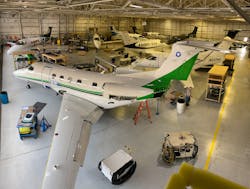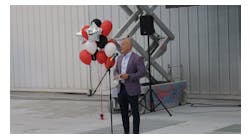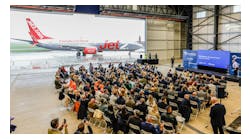Customer Satisfaction Above All Else
AeroStar Aviation got its start in 2014, focusing on maintenance for the Embraer Phenom 100 and Phenom 300 aircraft. The company has since become an FAA-approved MRO facility with more than 25 employees. Christopher Grinnell, president, said the company has seen tremendous growth even through the COVID-19 pandemic and it isn’t slowing down anytime soon.
Grinnell initially launched AeroStar Aviation in Texas after leaving Embraer, where he worked extensively with the Phenom 100 and Phenom 300 aircraft. Since then, the company has expanded to the East Coast, providing aircraft on ground (AOG) support in the Eastern United States and Caribbean. AeroStar Aviation specializes in quality, expeditious maintenance on the Phenom 100 and Phenom 300 aircraft, though Grinnell said the company is looking to expand into larger cabin aircraft in the next 12 months.
Customers First
AeroStar Aviation is focused on returning its customers to the air faster than its competitors. The company invested a considerable amount of money into a parts surplus to reduce the amount of time its customers wait for maintenance. “It’s never convenient to have an AOG,” Grinnell noted. “These private owners have these aircraft because they want to go where they want to go. They don’t want to have delays. I found ordering parts and waiting overnight just became an inconvenience.”
Grinnell launched an initiative called the Embraer Phenom 100/300 Wheel Assembly Exchange Program to reduce the wait time for wheels and tires. Grinnell said this program also allows customers to receive new equipment cheaper than purchasing it through an OEM. “If a customer just wants to pass through, I already have a wheel in stock,” he explained. “If a customer just drops in and says ‘hey, my tire has a cut’ or ‘I’ve got damage,’ I can quickly get him returned back to service because we have those parts in stock,” he noted.
Grinnell said the program helps return customers to service more quickly and allows them to buy their own spares on demand. “We will sell customers our spares at a cost but if you go to purchase some spares from the OEM or other sources, they have very long lead times,” he mentioned. “I’m talking 180 days, and this was pre-COVID. So if the customers want to buy them, we’re able to save them a substantial amount of money by just being part of our Wheel Assembly Exchange Program.”
AeroStar Aviation also invested in two Phenom 100 aircraft to combat equipment shortages during the COVID-19 pandemic. The company parts out these aircraft to reduce maintenance turnaround time. Grinnell said the company is also working on plans to reduce the time it takes to complete 120-month inspections for the Phenom 100 and Phenom 300 aircraft.
“Typically, it takes five to six weeks to complete the task,” he said. “With our investments we’re putting in place, we’re hoping to bring the inspection task down to three weeks. We’re going to have landing gear onsite on an exchange basis at the time of induction. We will minimize the downtime by three weeks.”
For people that own the Phenom or even for operators that are charter 135, revenue is a huge importance Grinnell mentioned. “So, if we can return the aircraft even two weeks earlier than we were previously able to, that’s going to get them back up in the air and I think that will be a huge benefit for them.”
The company also provides aircraft consulting services to its customers who need help evaluating a plane before purchase. “With our expertise and our focus being on the Phenom 100 and 300 aircraft, we do a lot of consulting for buyers that want to purchase an airplane but they’ve never owned a jet. We also help with evaluations of aircraft that are not based in the United States. We can evaluate how it’s been maintained in the previous ownership and see if it’s going to be a right purchase for the customer.”
Service Expansion
Grinnell says AeroStar Aviation is working to expand into larger-cabin aircraft in the near future. “The Phenom 100/300 is a great entry-level jet but we see a lot of requests for the Legacy 450/500 and Praetor 500/600 and even the Legacy 600/650. So, we’re targeting Phenoms and we’re trying to grow into those larger-cabin aircraft in the next twelve months.”
The company is also working on developing its aftermarket capabilities for the Phenom 100 and Phenom 300. “Because the Phenom 100 and Phenom 300 are still relatively young aircraft, there aren’t a lot of aftermarkets,” Grinnell said. “We definitely started seeing great success with digging into aftermarket capabilities. We’ve been doing a lot of interior refurbishments.”
Growth Through the Pandemic
Grinnell says AeroStar Aviation has seen explosive growth since it started in 2014, even through the COVID-19 pandemic. The company’s customer base has changed, but it still manages 20 percent growth year-over-year, sometimes even reaching 30 percent.
“We’re always experiencing impacts from COVID-19 with technicians or employees coming up with COVID. So, of course we have to quarantine, we do traceability and we follow all the protocols that the CDC requires,” Grinnell noted. “But I will say I think we have seen a shift in corporate aircraft ownership and charter. We’re busier than pre-COVID.”
Pre-pandemic, the company’s customer base was 60 percent private owners and 40 percent charter operators. That has shifted to 85 percent private owners and 15 percent charter operators.
“I think COVID has definitely brought to realization for a lot of people that they want to have their own aircraft,” he noted. “If they’re on charter, yes they have quality machines, but they don’t know who was on it before. When it’s their own aircraft, they know who was on it, the last time it was flown and who’s maintaining it.”
COVID has put in people’s mindsets that they want privacy, he says. "They want cleanliness and they want to know who’s flying on their airplane,” Grinnell said. “With Embraer selling the Phenom 300 and it being the most popular jet out there, it has really benefited us as well as the aircraft brokers selling the airplanes.”
The pandemic also pushed the company to purchase its own single piston aircraft it uses for AOG requests. Grinnell said it’s a precaution against COVID-19 because it prevents the technicians from boarding a 300-person aircraft. It also cuts down on drive time by 50-60 percent. “We can dispatch quicker, we can get to the aircraft sooner and we don’t have to worry about exposing anyone or being exposed to any type of COVID-related incident,” he noted.
Grinnell said he thinks the company is finally starting to get traction with its reputation, name and brand awareness. “People feel comfortable coming to us versus going to the OEM. I think that has a lot to do with it,” he said about the company’s growth. “It also helps that the Phenom 300 has been the best-selling light market aircraft out there for the past nine years.”
“Being in business for the past seven years, our growth has been significant. I’m proud of our growth and I feel that we built a great brand. There have been a lot of growing pains but I wouldn’t trade them for anything else,” Grinnell concluded.



